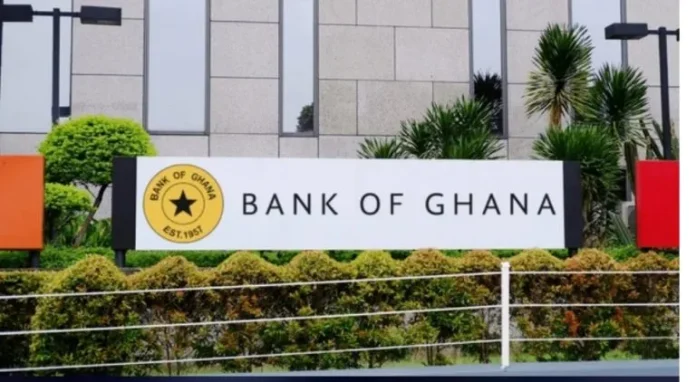Ghana’s government spent GH¢21.5 billion less than planned in the first seven months of 2025, keeping total expenditure 14% below target in what the Bank of Ghana describes as evidence of improved fiscal discipline under IMF program constraints.
Total government spending reached GH¢131.1 billion between January and July, equivalent to 9.4% of GDP, compared to a programmed target of GH¢152.6 billion or 10.9% of GDP, according to the central bank’s September 2025 Monetary Policy Report. While overall expenditure grew 9.3% year on year, the government managed to contain spending more effectively than planned, suggesting stronger expenditure controls.
The most dramatic improvement came in interest payments, which totaled GH¢28.9 billion, about 19.5% lower than the GH¢36 billion target. The Bank of Ghana attributes this decline to falling domestic interest rates and cedi appreciation, which reduced the cost of servicing external debt. For a government that’s been hemorrhaging money on debt service, that’s the kind of news that creates actual fiscal breathing room.
Only one major expenditure category exceeded budget: compensation of employees reached GH¢44.9 billion, a slight overrun reflecting the government’s commitment to meeting wage and salary obligations despite tight fiscal conditions. Employee compensation accounts for more than a third of all spending during the period, underlining why civil service reform remains such a politically sensitive topic.
But here’s where the fiscal discipline story gets complicated. Capital expenditure collapsed to GH¢10 billion, a massive 63% shortfall compared to the programmed GH¢22.4 billion. Domestically financed capital spending under the government’s Big Push Initiative amounted to GH¢6.6 billion, while foreign-financed projects contributed GH¢3.4 billion.
That steep decline in infrastructure investment could slow economic growth and affect job creation over the medium term. Capital expenditure typically drives productivity improvements and creates employment opportunities. When you slash capital spending by nearly two-thirds, you’re not just exercising fiscal restraint; you’re potentially sacrificing future growth for current stability.
The government cleared GH¢4.8 billion in arrears during the period, below the GH¢8.1 billion target but with one crucial detail: no new arrears accumulated. That represents a significant shift from previous years when arrears kept piling up, adding pressure to the fiscal deficit and complicating cash management. It’s the kind of unglamorous achievement that signals genuine systems improvement rather than political theater.
The spending patterns align with Ghana’s ongoing fiscal consolidation under the IMF-supported program, which aims to stabilize the macroeconomic environment, restore debt sustainability, and rebuild investor confidence. By keeping spending below target, the government created fiscal room to manage revenue shortfalls and absorb external shocks.
Whether this discipline proves sustainable is another question entirely. Ghana faces growing social demands, and electoral spending pressures typically increase as political cycles progress. The government’s ability to maintain restraint when constituents are demanding more services and infrastructure will test whether these improvements reflect structural reform or temporary compliance with IMF conditions.
There’s also the uncomfortable reality that fiscal discipline achieved primarily through slashing infrastructure spending isn’t really sustainable development. Ghana needs roads, hospitals, schools, and digital infrastructure. Delaying those investments saves money today but creates larger problems tomorrow when deteriorating infrastructure constrains economic activity.
The interest payment savings offer some hope that fiscal space can be created without completely sacrificing development spending. If domestic interest rates continue declining and the cedi remains relatively stable, the government could redirect some debt service savings toward capital projects. But that requires maintaining the macroeconomic stability that’s enabling lower borrowing costs in the first place.
Fiscal analysts worry about balancing prudence with development needs. Ghana’s economic challenges didn’t emerge overnight, and they won’t disappear through budget cuts alone. The country needs productive investments that generate the growth required to sustainably reduce debt ratios and expand fiscal capacity.
The September 2025 Monetary Policy Report shows a government that’s learned to live within its means, at least temporarily. Total expenditure came in below target across nearly every major category except wages. Arrears stopped accumulating. Interest costs declined significantly. These are real achievements that deserve recognition.
But the 63% collapse in capital spending raises questions about whether Ghana is solving its fiscal problems or just postponing them. Infrastructure doesn’t become less necessary because you delay building it; the need just grows more urgent and eventually more expensive to address.
For now, the IMF will likely view these numbers positively. The program emphasizes fiscal consolidation, and Ghana is delivering that consolidation in headline terms. Whether the specific composition of spending cuts, particularly the infrastructure investment collapse, serves Ghana’s long-term development interests is a separate question that extends beyond IMF program metrics.
The real test comes in subsequent budget cycles. Can Ghana maintain expenditure discipline while gradually increasing productive capital spending? Can the government sustain reduced arrears accumulation and lower interest costs? And can political leaders resist electoral spending pressures that typically undermine fiscal consolidation efforts?
Ghana’s first seven months of 2025 demonstrate improved fiscal management, particularly in interest costs and arrears control. Whether this represents lasting reform or temporary compliance with external conditions will become clear over the next year as the country navigates both economic recovery and political pressures.
Source: newsghana.com.gh











